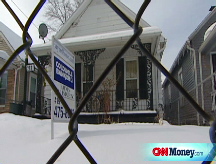HUD Secretary: We must limit foreclosures
In an exclusive interview with CNN's Gerri Willis, Shaun Donovan talks about what's needed to get the housing market and economy back on track.
 |
| Catch Gerri Willis on "Your Bottom Line" on CNN on Saturdays at 9:30am ET and HLN on Saturdays and Sundays at 3:30pm ET. |
NEW YORK (CNN) -- With Treasury Secretary Tim Geithner set to unveil a new plan to help banks and homeowners Tuesday, and the Senate tentatively prepared to vote on a $780 billion stimulus bill that day as well, this will a busy week in Washington.
Another part of the government that will play a key role in trying to get the economy and housing market back on track will be the Department of Housing and Urban Development (HUD).
In an exclusive interview on CNN's "Your Bottom Line", Gerri Willis spoke with HUD Secretary Shaun Donovan about how he will be involved in the Obama administration's economic recovery initiatives. Here are some of the highlights.
CNN: One in ten Americans in default, behind on their payments, in foreclosure. What will you do to help people in this situation?
Donovan: Well, let me say that there are really four things that we have to do. First and foremost, this crisis started as a mortgage crisis, but what is really driving the foreclosure crisis right now is that people are losing their jobs. And so job number one is to pass a recovery bill that will add three to four million jobs in this country. That's first.
Second, we have to limit the number of foreclosures. I've seen recent numbers that almost half of the home sales in this country are distressed sales, right now. And so, as the President has said, we will have a comprehensive, aggressive plan to limit foreclosures, announced in the coming weeks.
Third, we have to make sure that the foreclosures that actually happen, don't have a devastating impact on families and on communities. And HUD is really the lead in doing that, through neighborhood stabilization efforts, but also efforts to make sure there's adequate rental housing, and to limit homelessness. And there are in the recovery bill, significant efforts at doing all of those things. And then finally, we've got to put a bottom on housing prices and begin to help the market turn back upwards.
CNN: Let's talk about HUD's Hope for Homeowners program, which is largely regarded as flawed. What will you do with that program?
Donovan: I think it is absolutely critical that we fix the program. You rightly said that there were 111 applications in October, in the first month of the program. We have been in active discussions with both the House and the Senate, about a set of fixes to that program, that will make the program more efficient and more effective, and can really begin to help turn around the housing market.
CNN: What do you have to do to fix HUD? And secondly, will it make it difficult to go after the problem of housing?
Donovan: I think one of the things that we can do in housing, and frankly that's part of my background, that was an important part of my becoming HUD secretary, is that there has been an enormous amount of innovation at the state and local level in housing.
The problem is that HUD has been left behind. HUD is really a generation behind what's happening in housing in state and local areas across the country. And so, first of all, what HUD needs to do, is to catch up. To modernize its programs, to use the private sector, to bring the private sector in in a way it hasn't, to public housing and to a range of other programs. And, we have to create accountable government.
CNN: What do we do with the foreclosed and abandoned homes that are increasingly populating our cities and towns?
Donovan: Well, this is something that's an absolutely critical issue. This past summer, as part of the housing and economic recovery act, there was close to 4 billion dollars that was put into a fund, a program that was called the Neighborhood Stabilization Program, that HUD is in the process of distributing. And, from personal experience, I have already begun to see the impact that that kind of funding can have on stabilizing neighborhoods.
CNN: How can you encourage lenders to actually get out there and make loans?
Donovan: What we are finding, and we've had significant discussions with servicers around the country at this point, is that, we now have, given the condition of the housing market, there is an alignment of interests beginning to occur between the investors and the servicers and the homeowners.
And what I mean by that is, that there is, it is more cost effective for the servicer, rather than going through foreclosure, to go after that home, undertake the cost of foreclosure, try to resell that home. In a large number of cases, it is better for the servicer, and for the investor, to be able to modify that mortgage, keep that family in their home, and be able to recover as the housing market recovers, the money in that loan. And what we are working on is a plan to create a set of incentive, assistance, to do that, while at the same time making sure that we have the tools that will ensure that lenders do it, through a range of options.
CNN: You definitely have big goals. But, where you expect to get traction first against this housing problem, is in modifying loans?
Donovan: Modification of loans is absolutely critical. But, I don't think it's an either/or question. We have to make sure that we're having a significant increase in the modification of loans. At the same time, there are going to be foreclosures, there already have been. We have to limit the impact of those foreclosures on communities and on the families that are experiencing them.
And then finally, we also have to think about ways to put a floor under the housing declines that we've had, through a series of proposals. Lowering interest rates, which we've already done to levels we haven't seen since the 1960s, to make sure that we don't see further declines, which are gonna drive further foreclosures. All of that has to happen on the housing front, while we're also creating 3 to 4 million new jobs through the recovery package, so that people can afford to pay their mortgages.
CNN: Mortgage rates actually are not at their all-time lows. Republicans are suggesting 30-year fixed rates should go to 4 to 4.5%, somewhere in that range. Do you back that?
Donovan: It's something that we're actively looking at. The administration has not made a decision about at this point, exactly what that plan ought to be, and what it should look like. Frankly, I think on the one hand, we understand the need to bring interest rates down, but we also have to think about a way to do it that's really targeted. The potential cost of some of these plans is in the hundreds of billions, if not trillions of dollars.
And so, how it's targeted to make sure it reaches the homeowners that really need it to move them off the sidelines, if you will. To take those folks who are ready to buy, who want to buy, and get them into the housing market, that's critical. But we need to make sure it's done in a targeted way, that gets the job done, but also doesn't increase the deficit or put the country further into economic crisis.
CNN: Do you support the expanded tax credit for homeowners? $15,000?
Donovan: That is something that I think, again, is an important way to start to get people off the sidelines. I think the question about that is how targeted it is. Whether it's really moving the people who wouldn't have been homebuyers into the market, and I think we have to make sure that it's targeted in a way that it reaches the homebuyers that really are going to help to turn this market around. ![]()



